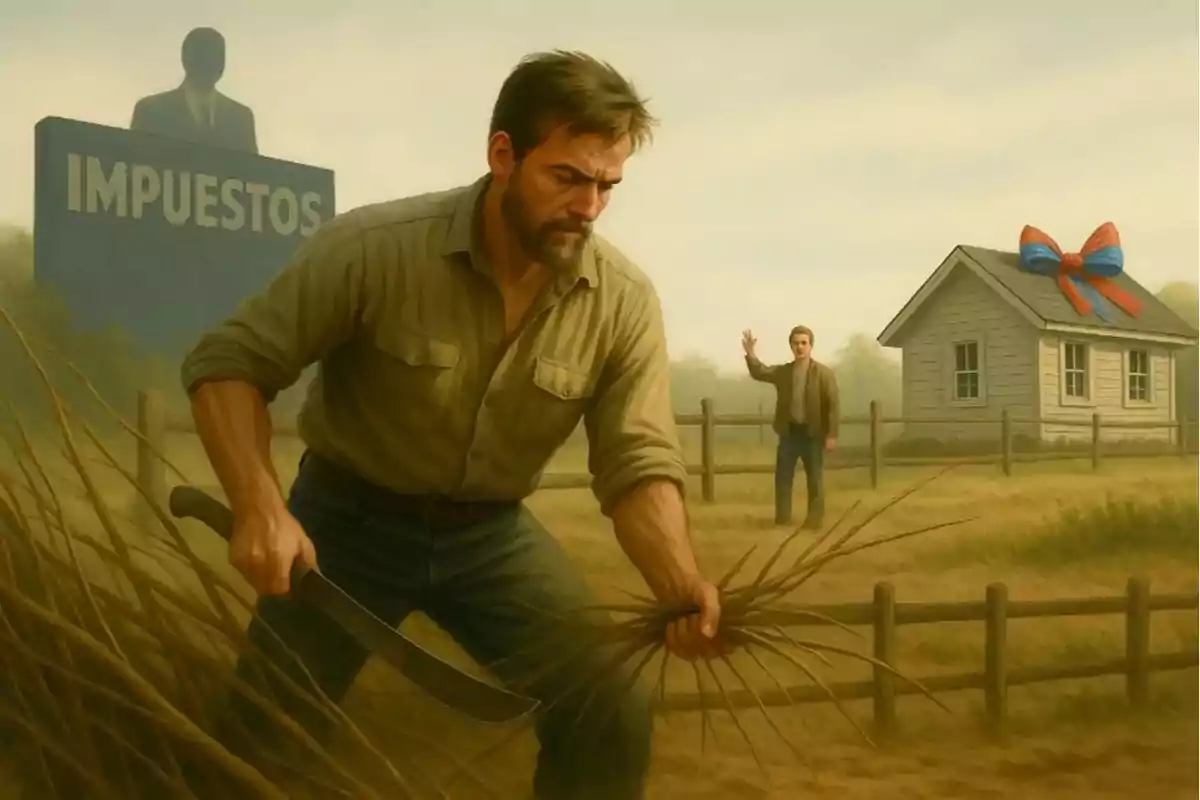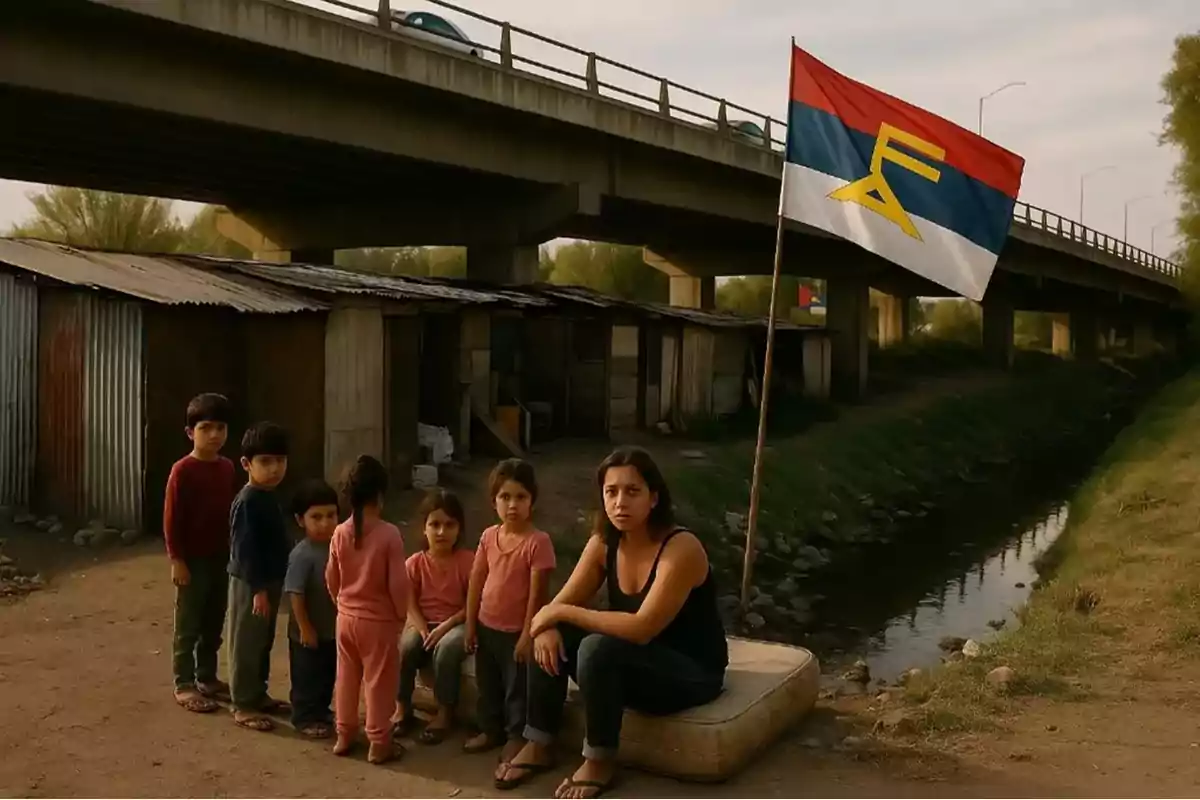
From myth to plunder: the truth about the State
What the State is not and what the State is
Last Sunday I was cleaning the land that we bought with great effort a few years ago, with the intention of building our house, something that is becoming increasingly difficult to achieve. Considering that, as slaves of the political system, it is not possible to save what is necessary.
Between the rent for those registrable assets that we have to pay to Mr. Government, contributions and licenses, labor tax, when they take from us nearly what would be five tithes, who knows for what reason.
It becomes impossible for us, unless we do not contribute at all to society, or very little, in that case and if the caste considers us its political capital, potential devoted voters, then it will give us a house at the expense of the thousands who will never be able to build one.
Every peso spent by the state is one less peso that we, who with market means, pure benefit to society, contribute to the country's well-being, will not be able to use.
The great writer and economist Milton Murray Rothbard tells us in his book "Anatomy of the State" what the state is not and what it is; here I will refer to these aspects on which we can reflect.
What the state is not.
We have been told that the state is an institution at the service of the population, a benevolent organization, sometimes inefficient, but destined to achieve the "goals of humanity," that is, higher social ends, which competes for resources with the private sector.
With modern democracies and through the apparatuses of legitimization, journalism, philosophers, economists, artists, and athletes, we are made to believe that the state "is all of us."
If the state is all of us, anyone who tries to attack it would be attacking all of us, and if it inflicts pain on us, we are doing it to ourselves, therefore, it is for our own good, since it is a voluntary act.
If the state incurs enormous public debts making the majority pay a group, such as the UPM Train or the stay of the 33 million in memory of a former terrorist, thus we are made to believe that the debt is with ourselves, and it is deserved.
Someone commented on all that could be done with the billions that they will make us pay for the train for UPM; if our politicians make them such a gift, then there is money.
The truth is that the money doesn't exist; they will make us pay with more poverty and nobody asked us.
The entity called state doesn't exist either; it is a group of organized people who try by all means to live off the work of others, a characteristic of any statist ideology, of which socialism is the first.
A government of majorities, as current democracy assumes, implies an intrinsic nonsense; the elected minority imposes its wishes on the majority that voted for them and on the rest who did not, always acting against the interests they claim to represent.
Below, I present some data, with the specific official references at the end of the publication.
32% of children under 6 years old are poor

Starting in 2024, two new ways of measuring poverty were established: a multidimensional index that yielded a value of 18.9%, and another, by income line with a basket more adjusted than the previous one; from what I could investigate, there are no measurements for previous years.
https://derechadiario.com.ar/uruguay/politica/marcelo-abdala-reelecto-pit-cnt-con-solo-418-votos
The 2017 base methodology, of the new income line, estimates total poverty for 2024 at 17.3%; the most alarming data is the 32% child poverty, while 6% of those over 65 years old are poor.
I referred to structural poverty and its causes in the article "The Lesson We Do Not See: National Industry and Structural Poverty."
The following table summarizes some of the most relevant economic indicators, comparing the year 2019 with 2024; the results are not encouraging for our near future:
| Indicator | 2019 | 2024 |
|---|---|---|
| Loss of value of the peso (CPI inflation) | 8.1% (8.8%) | 4.9% (5.1%) |
| Poverty (2006 method) | 8.8% | 9.1% |
| Unemployment rate | 9.1% | 7.4% |
| Real GDP growth (2016 base) | 0.9% | 3.1% |
| Gross public debt (% of GDP) | 53.3% | 57.2% |
| State spending (% of GDP) | 30.61% | 31.14% |
The Minister of Economy of the previous government remained firm in her "fiscal rule." Susana Arbeleche did a better job than her predecessor, receiving a fiscal deficit of 4.7% in 2019 and in 2024 delivered it at 4.1%.
Considering the health emergency of the Chinese virus, the Russian invasion of Ukraine, the great drought, and the impacts of the "gifted" Kirchnerist Argentina, with an estimated cost to the public coffers of U$S 4,000 million (almost 5% of GDP).
So many years of state socialism cost us more and more poverty; already in 2018 we had a UNDP (UN) report indicating household poverty at 21.3% and their vulnerability at 39.4%.
What the state is
In the middle of the cleaning task, the "tenant" of the adjoining land appeared, complaining about the great extra cost he must pay to the "broken bag" of the BPS to build his home; he also wonders why half of his salary is taken by politicians, and it is never enough for them.
https://derechadiario.com.ar/uruguay/politica/los-alcahuetes-del-frente-amplio-se-premian-sin-piedad
When I began to explain to him that, to achieve a substantial improvement in our condition, we must aim for a state of zero size, he asked: "What are we going to live on if there is no state?"
Notably astonished, I replied, we will live on 100% of what we produce.
Rothbard tells us that the social path dictated by nature is that of property rights and the free market; man discovers through the process of production and exchange that he can improve his condition.
The means of the state
In contrast to the natural means mentioned, those of the market or economic means, Franz Oppenheimer mentions the alternative path, the political means: appropriating by force the wealth of another, who made the effort to produce it.
In particular, the only organization that obtains its income by political means, force, violence, and coercive threats.
The rest of the institutions obtain their income by market means, the peaceful and voluntary way, exchanging them for goods or services valued by the population.
In the free market, we choose who will provide them to us, "voting" who will use our capital and the size of the companies.
Political methods of the state destroy society.
When referring to the means used by politicians to appropriate the wealth of the larger group they claim to represent, Rothbard calls it unnatural; it is always imposed by force, despite attempts to legitimize it with papers signed by them, laws that politicians create for their own benefit.
The method is destructive because the resource transfers carried out not only reduce the number of those who produce, but also reduce the incentive for each one to produce beyond what is necessary for their own survival, as was the case in the past.
That consequence generates fewer goods to be exchanged in society; that is why this type of idea, when applied, always ends in widespread poverty for the population and unprecedented wealth for those who govern, our parasitic caste.
In conclusion
The state is not all of us, it is not "us" nor is it the "human family". It is the social organization that tries to obtain and maintain the monopoly on the use of force and violence in a given area.
The state is not a means to improve the life of the population, neither by definition nor by the means it uses, which are unnatural, that is, against the very nature of the human being.
It is always financed by a coercive source, the very nature of taxes; nobody pays them voluntarily, at least not us, the net payers, who live in the private sector producing goods for voluntary exchanges.
If we want a prosperous society, we must stop idealizing the State as an omnipresent benefactor, which is neither neutral, nor efficient, nor fair.
True justice and well-being arise from the respect for the work of others, free exchange, and the right to live with the full fruit of one's own effort.
More posts: